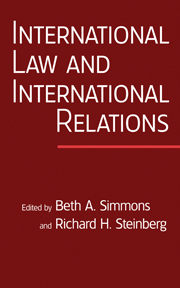Book contents
- Frontmatter
- Contents
- Contributors
- Abstracts
- Preface
- Editors' Note
- PART I INTERNATIONAL REGIMES THEORY: DOES LAW MATTER?
- PART II COMMITMENT AND COMPLIANCE
- PART III LEGALIZATION AND ITS LIMITS
- 6 The Concept of Legalization (2000)
- 7 Legalized Dispute Resolution: Interstate and Transnational (2000)
- 8 Legalization, Trade Liberalization, and Domestic Politics: A Cautionary Note (2000)
- 9 Alternatives to “Legalization”: Richer Views of Law and Politics (2001)
- PART IV INTERNATIONAL LAW AND INTERNATIONAL NORMS
- PART V TREATY DESIGN AND DYNAMICS
- PART VI LAW AND LEGAL INSTITUTIONS
- PART VII OTHER SUBSTANTIVE AREAS OF INTERNATIONAL LAW
- References
- Index
9 - Alternatives to “Legalization”: Richer Views of Law and Politics (2001)
Published online by Cambridge University Press: 05 June 2012
- Frontmatter
- Contents
- Contributors
- Abstracts
- Preface
- Editors' Note
- PART I INTERNATIONAL REGIMES THEORY: DOES LAW MATTER?
- PART II COMMITMENT AND COMPLIANCE
- PART III LEGALIZATION AND ITS LIMITS
- 6 The Concept of Legalization (2000)
- 7 Legalized Dispute Resolution: Interstate and Transnational (2000)
- 8 Legalization, Trade Liberalization, and Domestic Politics: A Cautionary Note (2000)
- 9 Alternatives to “Legalization”: Richer Views of Law and Politics (2001)
- PART IV INTERNATIONAL LAW AND INTERNATIONAL NORMS
- PART V TREATY DESIGN AND DYNAMICS
- PART VI LAW AND LEGAL INSTITUTIONS
- PART VII OTHER SUBSTANTIVE AREAS OF INTERNATIONAL LAW
- References
- Index
Summary
The authors of “Legalization and World Politics” (special issue of IO, summer 2000) have done an excellent job connecting one branch of thinking about international law (rooted in the legal theory of H. L. A. Hart) to one branch of thinking about international politics (neoliberal institutionalism). However, the connections between the two disciplines are broader and deeper than the volume indicates. International legal scholars have long understood that international law is more than the formal, treaty-based law on which the volume's authors focus their work. Law is a broad social phenomenon deeply embedded in the practices, beliefs, and traditions of societies, and shaped by interaction among societies. Customary international law displays this richer understanding of law's operation as does the increasingly large body of what has been termed “interstitial law,” that is, the implicit rules operating in and around explicit normative frameworks. Similarly, legal pluralist analysis of domestic and international legal systems focuses on the interaction of overlapping state and nonstate normative systems.
We show how a fuller appreciation of what international law is and how it influences behavior allows room for a wealth of intellectual connections between international legal scholarship and research in international relations – connections that are not evident from the framing of the “legalization” phenomenon in the IO volume.
- Type
- Chapter
- Information
- International Law and International RelationsAn International Organization Reader, pp. 188 - 202Publisher: Cambridge University PressPrint publication year: 2007
- 1
- Cited by



